Waqf Tribunal
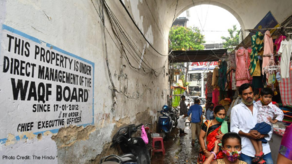
The Waqf Tribunal, established under the Waqf Act, 1995, primarily adjudicates disputes related to waqf properties, including questions about whether a property is waqf, conflicts over management, and rights of mutawallis (caretakers) or beneficiaries. It has the authority to handle cases involving mismanagement, unauthorized occupation, and can order the eviction and restoration of waqf property. The Tribunal also hears appeals against decisions of the Waqf Board and can issue injunctions or directions to protect waqf assets.
Functions of the Waqf Tribunal: i. Adjudication of Waqf Disputes ii. Appeals Against Waqf Board Orders iii. Enforcement of Waqf Laws and Governance iv. Exclusive Jurisdiction Over waqf Matters
Legislative Framework
Section 2(q) of the Waqf Act, 1995 defines tribunal to mean “Tribunal”, in relation to any area, means the Tribunal constituted under sub-section (1) of section 83, having jurisdiction in relation to that area. As per section 83, of the Waqf Act 1995, the state government has the power to constitute as many tribunals as possible. This body is formed under the Waqf Act, 1995 where their power and regulations are outlined in Chapter VIII[1] of the Act. The constitution of the tribunal is by releasing notification under the official gazette. The Act also describes the power and restrictions of a Waqf Tribunal that acts in lieu of a civil court under its jurisdiction. The Waqf Tribunals are deemed to be a civil court and required to exercise all the powers and functions exercised by a civil court under the Code of Civil Procedure, 1908.
Sec 83(2) provides the right to any person aggrieved to approach Tribunal. As per the Waqf (Amendment) Act, 2025, if there is no Tribunal or the Tribunal is not functioning, any aggrieved person may appeal to the High Court directly.”
Members of Tribunals
Section 83(4) provides for the composition of Waqf Tribunal. According to the Waqf (Amendment) Act, 2025, there will be three members in the tribunal;
- one person, who is or has been a District Judge, who shall be the Chairman;
- one person, who is or has been an officer equivalent in the rank of Joint Secretary to the State Government—member;
- one person having knowledge of Muslim law and jurisprudence—member:.
Rules
The Model Waqf Rules, 2016 (Submitted by committee headed by Najama Heptulla) provides for Registrar and Assistant Registrar of Waqf Tribunals.[2] The Rules outline the structure and functioning of the Waqf Tribunal, emphasizing the qualifications, appointment, and tenure of its chairman and members. Appointments for the Chairman and members are conducted on a deputation basis, with specific qualifications required for each role, including advanced degrees in relevant fields or law, alongside proficiency in Urdu and Arabic. A selection board, led by the Secretary (Law), is responsible for appointing members, ensuring expertise in Islamic studies and law.
The deputation of Chairman and member of the Tribunal shall be for a period of three years, which may be extended for a further period of two years at the direction of the Government. The age of superannuation of the Chairman and the member shall be sixty two years.
- Members are appointed for three-year terms, potentially extendable, and must be below 50 years of age at the time of selection. The remuneration aligns with Group A government officers, reflecting the tribunal’s significance. The rules stipulate clear procedures for filing applications, which must be concise, well-documented, and signed by the applicant or their representative. The tribunal may accept incomplete applications in urgent cases.
- Each application is logged by the Registrar, who also sets hearing dates and ensures that documents are served to opposing parties, unless expedited circumstances justify otherwise. Strict timelines govern the submission of written statements and replies, with allowances for extensions in case of demonstrated need. The tribunal limits the number of adjournment requests to three per party to maintain efficiency. Decisions are made by majority vote among tribunal members, with final hearings typically involving the full bench, ensuring thorough and fair adjudication of disputes related to Waqf properties.
There are states, such as Rajasthan and Tamil Nadu have introduced changes in the rules of the Waqf Tribunal after the Model Waqf Rules 2016.
Rajasthan Waqf Tribunal Rules 2020
The Rajasthan Waqf Tribunal Rules of 2020[3] in Rajasthan establish a detailed framework for the functioning and administration of the Waqf Tribunal, focusing on the appointment and duties of its members.
The State Government is responsible for appointing a chairman and members with specific qualifications, such as legal expertise and knowledge of languages like Urdu, Arabic, or Persian. Members serve an initial term of one year, which can be extended, while strict disqualifications ensure integrity and impartiality in the tribunal. The rules also outline processes for filling vacancies, appointing a Registrar, and supporting staff, ensuring the tribunal operates smoothly.
When parties bring applications to the tribunal, they must adhere to the Code of Civil Procedure, submitting their cases within a specified timeframe and providing necessary documentation. The tribunal is required to notify involved parties about hearing dates, maintain a daily cause list, and has the authority to proceed with hearings even if a party is absent, although there are provisions for restoring applications under certain circumstances. Importantly, all orders issued by the tribunal must be documented and communicated effectively to the parties involved, maintaining transparency and accountability. Additionally, the rules allow for the inspection of case records, ensuring that parties can engage meaningfully with the proceedings. These rules aim to create a fair, structured, and efficient process for resolving disputes related to Waqf properties.
Tamil Nadu Waqf Tribunal Rules
The Tamil Nadu Waqf Tribunal (Conditions of Service and Procedure) Rules, 2016 provides for Waqf Tribunal consisting of a Chairman from the State Judicial Service, a Member from the State Civil Services, and a third Member with expertise in Muslim law. Their pay and tenure follow their existing service rules, and the Government fills any vacancies for the third Member. Applications must be submitted within 90 days, with clear steps for scrutiny, notice delivery, and responses from the other side. Hearings are structured, allowing for adjournments and accommodating legal representatives in cases of death. Orders are signed by the Chairman and the Members and are shared with the involved parties. The Registrar manages administrative tasks, ensuring everything runs smoothly. The Tribunal has set hours for operation and a dress code for members and staff, all aimed at maintaining order and delivering justice effectively.
Government Report Defined Waqf Tribunal
Sachar Committee
A suggestion given by the Sachar Committee[4] to the Prime Minister in 2006 about the Waqf tribunal, where they haven't been able to perform their responsibilities as assigned under the Waqf Act 1995. The reason was the state judicial services members were assigned more than one responsibility, resulting in a paucity of time to attend to waqf matters and they couldn't attend matters for more than a few days in a month. They recommended amendment to section 83(4) of the act 1995, a full-time presiding officer appointed for Waqf purposes will man the tribunal, and their power will give interim relief and award damages, etc depending on the cases.
Third JPC Report (2008) on Amendments to the Wakf Act, 1995
The Third JPC Report on Amendments to the Wakf Act, 1995 made recommendations for exclusive trial of Wakf cases in the Wakf Tribunals and the transfer of pending cases to it. It also recommeded to change the composition of Wakf Tribunal to a three member committee which was accepted and incorporated into the act.
Report of the Joint Committee on Waqf (Amendment) Bill, 2024
The Report of the Joint Committee on Waqf (Amendment) Bill, 2024 under the chairpersonship of Shri Jagdambika Pal recommended against fixing a time period for the disposal of the cases by Tribunal. It also recommended for revising the composition of waqf tribunal by incorporating a member having knowledge of muslim law and make it a 3 member body rather than a 2 member body. The committee also considered varied suggestions on the question of finality of the order of Waqf Tribunals and recommended for providing a statutory appeal to the high court and removing the finality to waqf tribunal.
Case Laws on Waqf Tribunal
In Faseela M. vs. Munnerul Islam Madrassa Committee & Ors. the Supreme Court recently addressed an important matter regarding the jurisdiction of the Waqf Tribunal under the Waqf Act of 1995. This case revolved around the eviction of a tenant from a property claimed to be waqf (charitable trust) property. he Supreme Court recently addressed an important matter regarding the jurisdiction of the Waqf Tribunal under the Waqf Act of 1995. This case revolved around the eviction of a tenant from a property claimed to be waqf (charitable trust) property. The court clarified that disputes regarding the eviction of tenants from waqf properties are exclusively within the jurisdiction of civil courts. The relevant sections of the Waqf Act do not cover eviction suits, which means such matters cannot be adjudicated by the Waqf Tribunal.
In Lal Shah Baba Dargah Trust v. Magnum Developers and Ors[5]., the Supreme Court dealt with important issues arising from the Waqf Act of 1995, particularly in light of its 2013 amendment. Initially, the Act allowed for a one-member tribunal to handle disputes related to Waqf properties. However, the 2013 amendment aimed to improve this system by establishing a three-member tribunal, which would include a judge from the State Judicial Service, a state civil service officer, and an expert in Muslim law. This change was meant to enhance the tribunal’s authority and effectiveness, while also explicitly preventing civil and revenue courts from intervening in matters related to Waqf properties. The controversy in this case emerged when the state failed to issue a notification to create the three-member tribunal. This left the Trust in a difficult position, as there was uncertainty about whether the existing one-member tribunal still had the jurisdiction to make decisions. The Trust argued that until the new tribunal was formally established, the one-member tribunal should continue to function. In contrast, the respondents claimed that the amendment effectively eliminated the one-member tribunal, necessitating an immediate shift to the three-member structure. The Supreme Court ultimately sided with the Trust, clarifying that the legislative intent was to enhance the tribunal’s functionality, not to dismantle it. The Court ruled that the one-member tribunal could continue to operate until the new three-member tribunal was officially constituted. It rejected the argument for implied repeal, asserting that the original Act and the amendment could coexist without conflict. The Court highlighted the necessity of having a functioning tribunal to handle Waqf-related disputes, emphasizing that the aim was to avoid any legal vacuum that could jeopardize the management of Waqf properties.
Official Database
Waqf Management System of India (WAMSI) Portal
The Waqf Management System of India (WAMSI) Portal provides a pie chart description on status of immovable property under waqf administration. It classifies property under litigation as Litigation (internal) and Litigation (external) where Litigation (Internal) i.e. at Waqf Boards and Litiagtion (external) i.e. at Tribunal and other Courts.
Thus, the status of overall pendency of cases related to waqf is published by WAMSI portal and it does not provide the breakdown for pendency at the level of Waqf Tribunal.
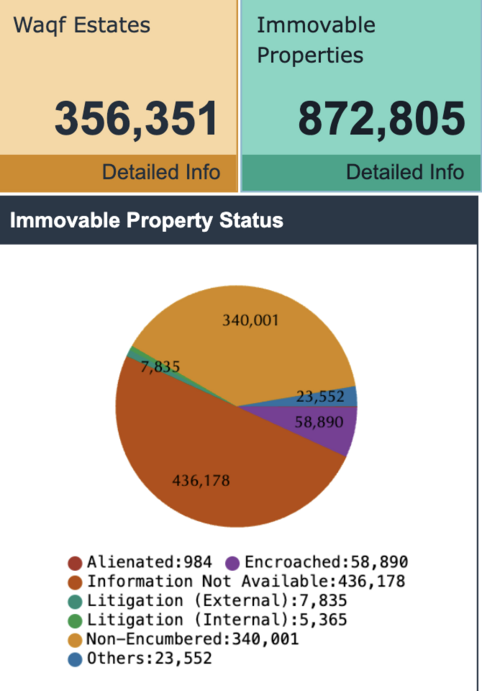
Status of Cases of Waqf Tribunal
The Ministry of Minority Affairs (GOI) analyzed the functioning of Tribunals and found that there are 40,951 cases lying pending in Tribunals out of which 9942 cases filed by the Muslims community against the Institutions managing waqf.[6]
The information on pendency in waqf tribunal is scattered. The following have been sourced
Category of Cases Before the Waqf Tribunal, Kozhikode
A submission given to a bench of the Kerala High Court by the Waqf Tribunal in 2022, where the original suit pending before the tribunal in Kozhikode in 2019 was maximum with 58, but remained 10 in 2022. Similarly, the original appeal was 71 cases in 2021.
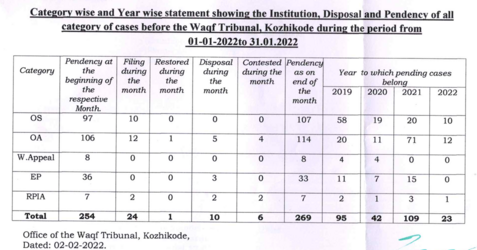
Cases decided by different courts in Bihar & the Apex Court
Whereas, in the submissions of endowment cases of Bihar[7], there are 22 cases taken up by their High Court, and the Supreme Court has 3 cases. The District Magistrate has to decide 400 cases compared to them; the Waqf Tribunal[8] has 57 cases before them. So far, the High Court has decided 44 cases in favour of the Waqf Board, and the apex court has decided only a single case favouring the board.
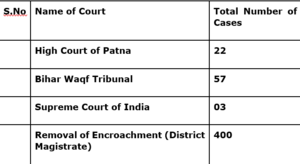
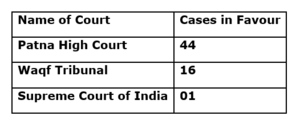
Research that engages with Waqf Tribunal
Resolution of Waqf Land Disputes: The Relevance of a Waqf Tribunal in Malaysia
This paper by Zati Ilham analyse reported cases involving Waqf lands in Malaysia and literature on ADR and Waqf to determine the best way forward to address this issue. Based on the recommendations by several authors, it is felt that the formation of a specialized body, namely the Waqf Tribunal could provide a viable solution to this problem.
References
- ↑ https://www.indiacode.nic.in/bitstream/123456789/15941/1/the_waqf_act%2C_1995.pdf
- ↑ Rule 2(n) of Model Waqf Rules, 2016
- ↑ https://minority.rajasthan.gov.in/pdfdownload/01152021170726PMTHE_RAJASTHAN_WAQF_TRIBUNAL_RULES_2020.pdf
- ↑ https://www.minorityaffairs.gov.in/WriteReadData/RTF1984/7830578798.pdf
- ↑ (2015] 10 S.C.R 966 available at : https://digiscr.sci.gov.in/pdf_viewer?dir=YWRtaW4vanVkZ2VtZW50X2ZpbGUvanVkZ2VtZW50X3BkZi8yMDE1L3ZvbHVtZSAxMC9QYXJ0IEkvTGFsIFNoYWggQmFiYSBEYXJnYWggVHJ1c3QgXyBNYWdudW0gRGV2ZWxvcGVycyBBbmQgT3RoZXJzXzE3MDE1MDAzMjgucGRm
- ↑ Explainer on Waqf Amendment Bill 2024;mPosted On: 13 SEP 2024 3:24PM; Press Note; Press Information Bureau; Available at: https://pib.gov.in/PressNoteDetails.aspx?NoteId=152139&ModuleId=3®=3&lang=1
- ↑ https://biharstateshiawaqfboard.in/cases-judgement/status-of-bihar-waqf-tribunal/
- ↑ https://biharstateshiawaqfboard.in/cases-judgement/status-of-bihar-waqf-tribunal/
